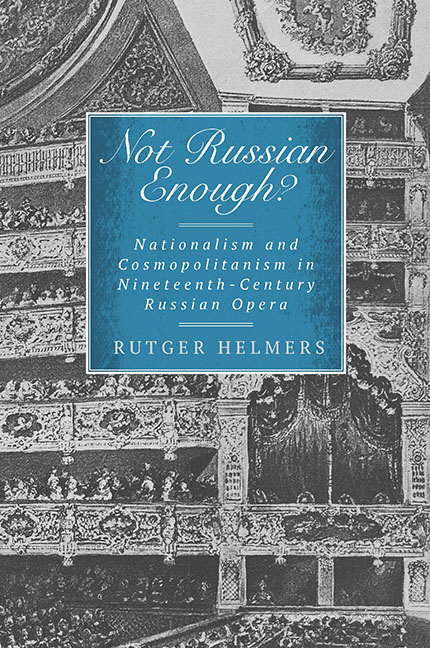Book contents
- Frontmatter
- Dedication
- Contents
- List of Illustrations
- Acknowledgments
- Editorial Notes
- Introduction: The Part and the Whole
- A Life for the Tsar and Bel Canto Opera
- Subject Matter, Local Color, and National Style in Judith
- French Theatricality and Inadvertent Russianisms in The Maid of Orléans
- The Tsar's Bride and the Dilemma of History
- Conclusion
- Abbreviations
- Notes
- Bibliography
- Index
French Theatricality and Inadvertent Russianisms in The Maid of Orléans
Published online by Cambridge University Press: 15 March 2018
- Frontmatter
- Dedication
- Contents
- List of Illustrations
- Acknowledgments
- Editorial Notes
- Introduction: The Part and the Whole
- A Life for the Tsar and Bel Canto Opera
- Subject Matter, Local Color, and National Style in Judith
- French Theatricality and Inadvertent Russianisms in The Maid of Orléans
- The Tsar's Bride and the Dilemma of History
- Conclusion
- Abbreviations
- Notes
- Bibliography
- Index
Summary
It was after browsing through a collection of Vasily Zhukovsky's works containing the translation of Friedrich Schiller's Die Jungfrau von Orleans that Pyotr Il'yich Tchaikovsky decided to write a work on Joan of Arc, a subject he thought had “a marvelous potential for music.” Joan of Arc had attracted composers at least since the eighteenth century, and the first half of the nineteenth had seen operas by Michele Carafa, Nicola Vaccai, Giovanni Paccini, William Balfe, and most famously, Giuseppe Verdi. More recent operas on the subject were those of Gilbert Duprez, the celebrated tenor, and Auguste Mermet, staged in Paris in 1865 and 1876 respectively.
Nevertheless, Tchaikovsky thought that the subject had not yet been exhausted: he found Verdi's Giovanna d'Arco (1845) “extremely bad” and knew that Mermet's Jeanne d'Arc, which had been presented with much ceremony as the first original production at the new Opéra Garnier, had failed to hold the stage. Tchaikovsky was interested in these two works, though, for he seemed to recall that Mermet's “clever and scenic libretto was much praised” and that Verdi's would be “useful to compare with the French one.” The composer collected “an entire little library” on Joan of Arc—including an edition of Henri Wallon's sumptuously illustrated monograph, given to him by his benefactress Nadezhda von Meck; Jules Barbier's play, for which Gounod had written incidental music in 1873; and Jules Michelet's historical study—and went to work.
On February 22, 1879, only three months after the idea of writing the opera had first occurred to him, Tchaikovsky could report to his brother Modest that he had finished the composition of the vocal score. Almost two years later, on February 13, 1881, his sixth opera, The Maid of Orléans, was premiered at the Mariinsky Theater, at the benefit of conductor Eduard Nápravník. The first performance was a great success with the audience, and the composer was called out no less than twenty-four times. The critics, however, were less enthralled. One anonymous reviewer observed that “many scenes are very successful, although in broad outlines they repeat the effects of Le prophète, La Juive, and other operas.” A truly devastating verdict came from the pen of César Cui.
- Type
- Chapter
- Information
- Not Russian Enough?Nationalism and Cosmopolitanism in Nineteenth-Century Russian Opera, pp. 82 - 112Publisher: Boydell & BrewerPrint publication year: 2014



